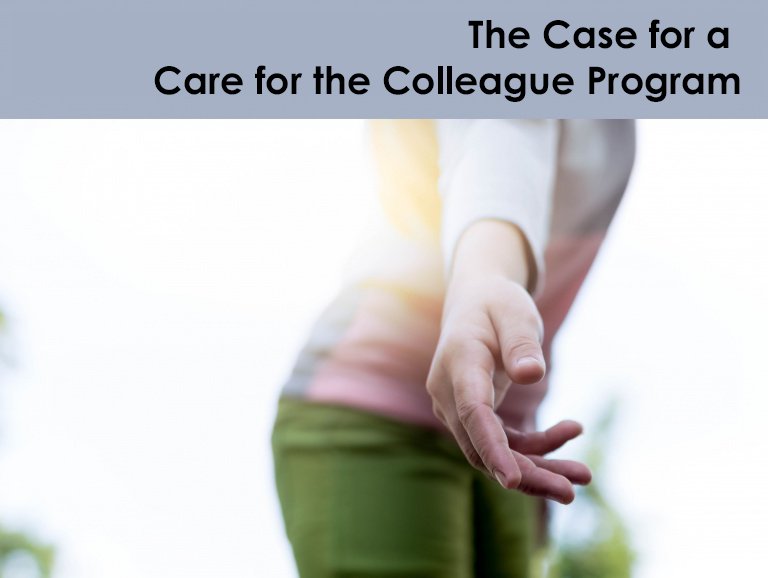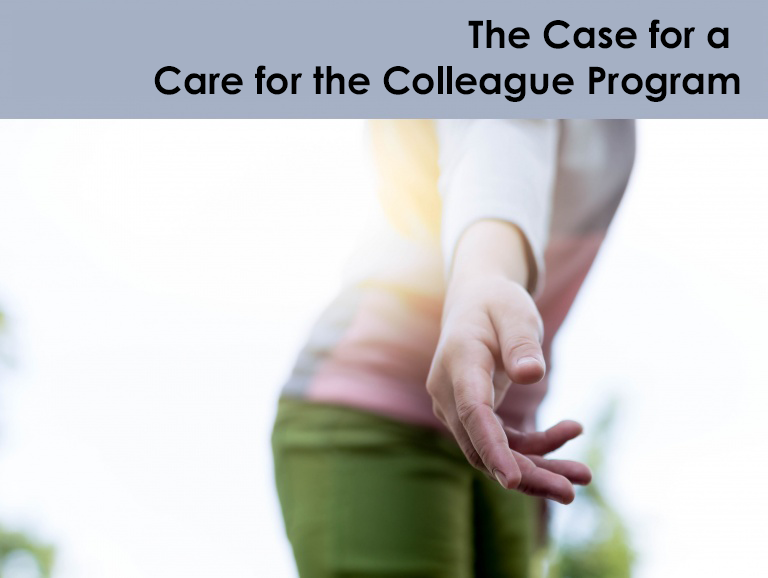- FHCQ Foundation for Health Care Quality
- COAP Care Outcomes Assessment Program
- Spine COAP Care Outcomes Assessment Program
- SCOAP Care Outcomes Assessment Program
- OBCOAP Care Outcomes Assessment Program
- CBDR
- Smooth Transitions
- WPSC Patient Safety Coalition
- Bree Collaborative Bree Collaborative
- Health Equity Health Equity
- Admin Simp
- Contact Us
THE CASE FOR A CARE FOR THE COLLEAGUE PROGRAM

THE CASE FOR A CARE FOR THE COLLEAGUE PROGRAM
by Kit Hoffman, PsyD | BESIDE Program Coach, Confluence Health
In the year 2000, a physician named Albert Wu coined the term “second victim” to describe the experience of physicians, and other medical care providers, who make a medical mistake. The patient, of course, is the first victim of a medical mistake. The medical care provider, who feels guilt, shame, anger, and helplessness following a medical mistake is the second victim.
Following a medical error, research shows that physicians, in particular, may also experience anxiety about making another error, loss of confidence in their abilities, difficulty sleeping, decreased job satisfaction, and harm to their reputation among other things.
THE 6 STAGES OF A SECOND VICTIM
Sue Scott and colleagues (2009) identified a traditional 6-stage trajectory to the process a provider goes through when involved in a medical error:
(1) chaos and accident response
(2) intrusive reflections
(3) restoring personal integrity
(4) enduring the inquisition
(5) obtaining emotional first aid
(6) moving on
After the last stage, Sue Scott and her colleagues (2009) found that the second victim will either go on to drop out, survive, or thrive. Dropping out includes leaving the profession or practice. Surviving is when the second victim is doing well enough to function but still has difficult memories, thoughts, or emotions related to the event. Finally, thriving includes finding some meaning in the event and possibly even growing from it.
THE PITFALLS OF PERFECTIONISM
“Systems that realize that health care providers are human and fallible have a better chance of catching and fixing errors before they reach the patient.”
Wu (2000) describes how a societal expectation for perfection not only increases shame when a medical mistake occurs, but also makes it difficult to report and remedy systemic errors, as people are hesitant to admit that they are not conforming to expectations of perfection. Even when a healthcare professional realizes that expectations of perfection are unrealistic, the societal pressure to perform at such high levels is immense.
Of course, perfect patient care is a worthy aspiration. This is not the same, however, as expecting perfect performance. To achieve this self-correcting system, healthcare professionals must feel comfortable reporting and talking about mistakes.
THE IMPACT OF PROACTIVE SUPPORT
To help healthcare professionals feel safe talking about their own mistakes, providing organizational support is essential. Ideally, this organizational support should include some form of emotional support, with an understanding that medical mistakes can have psychological impacts on all members of the care team involved with the patient. Providing this service proactively is important when working with healthcare professionals, as they tend to avoid seeking help for their mental health due to many factors in the culture of medicine that create stigma surrounding mental health (see Wallace, 2010 for a discussion).
WEBINAR – CARE FOR THE COLLEAGUE: BRINGING ENCOURAGEMENT AND SUPPORT IN DIFFICULT EVENTS
At Confluence Health, emotional support for providers and employees is fostered through a Care for the Colleague Program called . On September 27, 2018 I presented a webinar on this topic and the BESIDE program for the WPSC.
WEBINAR LINK: The recording from this webinar can be found here.
SLIDES LINK: The slides from this webinar can be found here.
My hope is that this webinar will help organizations embrace support for second victims as well as foster dialogue about de-stigmatizing mental health of healthcare professionals. When things go wrong with patient care, the best things we can do are listen to each other, offer support, and be okay with emotional pain. It takes a lot of courage for healthcare professionals to help patients day in and day out. It takes even more courage for healthcare professional to get help for themselves, and we can make it easier.
ABOUT THE AUTHOR
 Kit Hoffman, PsyD is developing and implementing the BESIDE Program at Confluence Health in Central Washington. BESIDE stands for Bringing Encouragement and Support in Difficult Events. BESIDE is Confluence’s Care for the Colleague program that supports healthcare providers involved in adverse patient events. Dr. Hoffman holds a Doctorate Degree in Clinical Psychology from the Chicago School of Professional Psychology in Los Angeles, California. Before coming to Confluence, Dr. Hoffman had a background in health psychology. In 2017, she completed her internship as a Behavioral Health Consultant at HealthPoint in Seattle, Washington. While she was at HealthPoint, she saw the need for providing support to overburdened medical professionals. Dr. Hoffman is passionate about delivering quality healthcare by supporting the wellbeing of our healthcare providers. To support her own wellbeing, Dr. Hoffman spends as much time as possible in the healing space of nature.
Kit Hoffman, PsyD is developing and implementing the BESIDE Program at Confluence Health in Central Washington. BESIDE stands for Bringing Encouragement and Support in Difficult Events. BESIDE is Confluence’s Care for the Colleague program that supports healthcare providers involved in adverse patient events. Dr. Hoffman holds a Doctorate Degree in Clinical Psychology from the Chicago School of Professional Psychology in Los Angeles, California. Before coming to Confluence, Dr. Hoffman had a background in health psychology. In 2017, she completed her internship as a Behavioral Health Consultant at HealthPoint in Seattle, Washington. While she was at HealthPoint, she saw the need for providing support to overburdened medical professionals. Dr. Hoffman is passionate about delivering quality healthcare by supporting the wellbeing of our healthcare providers. To support her own wellbeing, Dr. Hoffman spends as much time as possible in the healing space of nature.
WORKS CITED
Scott, S. D., Hirschinger, L. E., Cox, K. R., McCoig, M., & Brandt, J. (2009). The natural history of recovery for the healthcare provider ‘‘second victim’’ after adverse patient event. Quality and Safety in Health Care, 18, 325-330. doi:10.1136/qshc.2009.032870
Wallace, J. (2010). Mental health and stigma in the medical profession. Health, 16(1), 3-18. doi:10.1177/1363459310371080
Waterman, A. D., Garbutt, J., Hazel, E., Dunagan, W. C., Levinson, W., Fraser, V. J., & Gallagher, T. H. (2007). The emotional impact of medical errors on practicing physicians in the united states and canada. Joint Commission Journal on Quality and Patient Safety, 33(8), 467-674.
Wu, A. (2000). Medical error: the second victim: the doctor who makes the mistake needs help too. BMJ: British Medical Journal, 320(7237), 726.
Recent Posts
- TakeCharge This Patient Safety Awareness Week: 5 Steps to Safer Healthcare
- Stigma & Bias in Healthcare: The Obstacles, Consequences and Changes Needed
- Agility in Crisis: How The Everett Clinic responded to COVID-19
- Collaboration over Competition: How Pediatric Hospitals Can Thrive When They Work Together
- Reducing Stress for Health Professionals During the COVID-19 Pandemic


